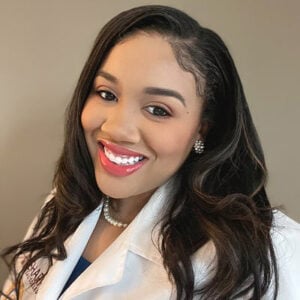A Town Hall sponsored by the Endocrine Society’s Early-Career Special Interest Group (SIG) provided attendees with insight into the professional journeys of a basic scientist, a translational scientist, and a physician-scientist.

The Early-Career Special Interest Group (SIG) Webinar “Insider Insights in the Scientist Pathway” welcomed three highly accomplished professors last week, who each shared valuable insights drawn from their unique scientific paths in endocrinology.
I served as a moderator for this webinar along with another Early-Career SIG leader, Manasi Shah, MD. This Town Hall provided an engaging platform from our expert scientists covering various topics such as navigating the complexities of protected time as a physician dedicated to research, as well as the broader pearls of wisdom such as establishing a successful research career.
Attendees had the opportunity to view slide presentations, which included slides about each presenter’s training journey accompanied by personal experiences and key lessons learned throughout their careers. A common theme throughout the discussions was the notion of resiliency, which underscores the important role that mentorship plays in guiding early-career professionals toward independence following postdoctoral training.
A Basic Scientist’s Perspective
Becca Riggins, PhD, a basic scientist and associate professor at Georgetown University Medical Center in Washington, D.C., kickstarted the session by providing an in-depth look into the life of a basic scientist. She discussed the challenges she faced in grantsmanship and the relatable struggle of unfunded grant ideas.
Throughout her talk, she discussed her commitment to creating an environment grounded in cultural responsibility, and inclusivity in training was mentioned. Additionally, the attendees were able to hear Riggins’ candid experiences of facing disappointment in her career, as well as the strategies she developed to overcome those challenges, which inspired attendees to view challenges and setbacks as opportunities for growth.
A Translational Scientist’s Perspective
Next, Michael A. Levine, MD, a physician-scientist and professor emeritus in pediatrics and medicine at the University of Pennsylvania’s Perelman School of Medicine, offered his perspective as a translational scientist. His presentation began with an exploration of the various definitions of translational research, as well as an overview of the numerous benefits of the National Institutes of Health (NIH) Clinical and Translational Science Awards (CTSA) Program.
Levine’s advice to the Early-Career SIG members included a slide that stated, “Think broadly, refresh often, and collaborate wisely.” Moreover, he echoed Riggins’ emphasis on the importance of mentorship. For those navigating clinical research, Levine stressed the importance of defining one’s scientific niche, which ensures the protection of research time — even with demanding clinical schedules. Additionally, Levine emphasized the importance of translational research in the advancement of medical science.
A Physician-Scientist’s Perspective
Concluding the webinar was Emily J. Gallagher, MB, BCh, BAO, PhD, MRCPI, a physician-scientist and associate professor of medicine in Endocrinology, Diabetes, and Bone Diseases at Mount Sinai in New York, N.Y. Gallagher has been a pioneer in establishing one of the first onco-endocrinology practices in the U.S. outside of a specialized hospital.
Her strides in onco-endocrinology demonstrate her dedication to being a clinical researcher, where her research focuses on investigating the obesity prevalence and treating metabolic conditions in cancer patients. Not only did Gallagher’s presentation detail her innovative research, but it also highlighted strategies to tackle complex medical issues.
Together, the insights and experiences shared by Riggins, Levine, and Gallagher provided attendees with a wealth of knowledge and inspiration to navigate these scientific pathways successfully. Overall, shared themes of resiliency and the role of intentional mentorship, are just some of the highlights that scientists and clinical researchers in endocrinology experienced at this Town Hall.
For more information about the Endocrine Society’s various Special Interest Groups (SIGs), click here.
Beasley, a postdoctoral fellow in molecular physiology and biophysics at Vanderbilt University, is a former Endocrine Society FLARE intern and currently serves on the Society’s Research Affairs Core Committee and on the Board’s Communication Task Force Committee, as well as on the Early-Career SIG.

